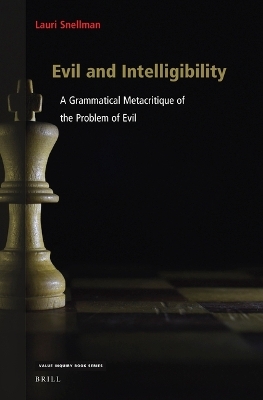
Evil and Intelligibility
Brill (Verlag)
978-90-04-52478-1 (ISBN)
This book develops a grammatical method for our underlying presuppositions which can help us unravel the problem of evil. The problem essentially rests on a dualism between fact and meaning. Evil and Intelligibility provides an examination of the grammar of being and of the intelligibility of the world, culminating in a philosophical grammar in which God, meaning, and evil can coexist.
Lauri Snellman is a Doctor of Theology (Helsinki, 2020). He is currently investigating the logic of worldviews in a research project at the Universities of Helsinki and Uppsala. He has written papers on Peirce’s pragmatism, Hamann, Wittgenstein, and the problem of evil.
List of Tables and Diagrams
1 Introduction
2 The Presuppositions of the Problem of Evil
2.1 Defining the Problems of Evil and Theodicism
2.2 Evil and Dualism in Modern Thought
2.2.1 Footnotes to Plato: Dualism and the Background for the Problem of Evil
2.2.2 The Problem of Evil as a Central Problem of Modern Thought
2.2.3 The Presuppositions of Theodicy in the Modern Debate
2.2.4 The Dualisms behind the Problem of Evil
2.2.4.1 The Modern Concept of the Fact
2.2.4.2 Appearances, Meanings, Real Facts and Values
2.2.4.3 The Principle of Sufficient Reason
2.2.5 The General Argument from Evil
2.3 Theism, Atheism and the Presuppositions of Theodicy
2.3.1 Leibnizian Theism as a Solution to the Problem of Intelligibility
2.3.2 Theodicism in Contemporary Philosophy of Religion
2.3.2.1 Mackie and Atheistic Analytic Theodicism
2.3.2.2 William Rowe and Divine Goodness
2.3.2.3 Plantinga on Omnipotence and Freedom
2.3.3 The Neo-Leibnizian Nature of the Current Debate
3 Metaphysics, Grammar and Evil: In Search of a Method
3.1 The Project of Antitheodicy
3.1.1 Antitheodicies: Conceptual, Moral and Moralistic
3.1.2 Antitheodicy and the Critique of Reason
3.1.2.1 Kantian Antitheodicism
3.1.2.2 Jamesian Antitheodicism
3.1.2.3 Hamannian Antitheodicism
3.1.3 Some Preliminary Arguments for Hamannian Antitheodicism
3.2 Philosophical Grammar and Grammatical Metacritique
3.2.1 Insights from Wittgenstein
3.2.2 Insights from Hamann
3.2.3 An Overview of Philosophical Grammar
3.3 The Metaphysical Modelling Debate in Analytic Philosophy
3.3.1 Matter, Form and Metaphysics
3.3.2 Metaphysics in the Good Company of Science?
3.3.3 The Antinomy of Metaphysical Realism
4 Language-Games, Categories and Practical Intelligibility
4.1 Language-Games: A Definition and Examples
4.2 The Practical Objectivity of Concepts and Models
4.2.1 Language-Games, Rules and the Possibility of Representation
4.2.2 Modelling, Morphisms and Hermeneutics
4.2.3 Realism, Idealism and the “Practical Matter-of-Factness” of Language
4.2.4 The Genealogical Priority of Language-Games
4.3 Language-Games and Categories for Being Qua Being
4.3.1 Language-Games for the Concept of Being
4.3.2 Discourse Possibilities for Seeking and Finding
4.3.2.1 Logical Forms and the Categories of Language Use
4.3.2.2 Categories as Types of Encountering Objects
4.3.2.3 Categories as Types of Concepts and Types of Objects in Encounters
4.3.3 Categories, being and the Models of Metaphysics
4.4 The Objectivity of Metaphysical Concepts and Models
5 Facts, Meanings and the Logic of Systemic Identification
5.1 Identification and Grammar
5.1.1 The Logic of Identification and Categories
5.1.2 Functions, Systems, Elements and Institutions for Identification
5.1.3 The Location of Individuals in Relationships and Identification
5.2 The Intertwining of Facts and Meanings
5.2.1 Seeing Facts as Meaningful in Language-Games
5.2.2 Facts, Meanings and Objects in Their Systemic Context
5.2.3 Some Examples and a Summary
6 The Principle of Reason and the Question of Intelligibility
6.1 The Principle of Sufficient Reason and Reasons for It
6.1.1 Definitions and Consequences of the Principle of Reason
6.1.2 Reasons for and against the Principle of Reason
6.1.3 The Principle of the Ground of Metaphysics and the Problem of Evil
6.2 Practical and Relational Intelligibility as a Critique of the psr
6.2.1 The Ambiguity of the Principle and the Plurality of Reasons
6.2.2 The Location of Reasons in Language-Games and Relationships
6.2.2.1 The Ground of “Reasons” and “Grounds” in Language-Games
6.2.2.2 The Grounds for Logical Spaces and Essences
6.2.2.3 The Contingency of Necessity
6.2.3 The Question of Reason and the Question of God
7 The Grammar of Worldviews and the Fallacies of Theodicism
7.1 Narratives, Virtues and Worldviews
7.1.1 Facts, Virtues and Narrative Identification
7.1.2 Humanistic Meaningfulness: Moral Responsibility, Virtue and Tragedy
7.1.3 Virtues and the Religious Concept of Salvation
7.2 Theological Grammar, Divine Goodness and Omnipotence
7.2.1 Theological Grammar and the Logic of Scripture
7.2.2 Theological Grammar, Goodness and Omnipotence
7.3 Biblical Grammar and the Fallacies of Theodicism
7.3.1 The Gospels and the Redemptive Sovereignty of God
7.3.2 Metaphors in the Book of Job and the Fallacies of Theodicism
7.3.2.1 Metaphors for God and Man in the Book of Job
7.3.2.2 The Speeches of Job and Atheistic Theodicism
7.3.2.3 The Speeches of Job’s “Friends” and Theistic Theodicism
6.3.2.4 The Speech of God and a New Grammar for “God”
8 Why the Argument from Evil Is Fallacious
9 Conclusion: The Problem of Evil and the Problem of Intelligibility
Bibliography
Index
| Erscheinungsdatum | 27.01.2023 |
|---|---|
| Reihe/Serie | Value Inquiry Book Series / Philosophy and Religion ; 379 |
| Verlagsort | Leiden |
| Sprache | englisch |
| Maße | 155 x 235 mm |
| Gewicht | 838 g |
| Themenwelt | Geisteswissenschaften ► Philosophie ► Erkenntnistheorie / Wissenschaftstheorie |
| Geisteswissenschaften ► Philosophie ► Logik | |
| Geisteswissenschaften ► Philosophie ► Metaphysik / Ontologie | |
| ISBN-10 | 90-04-52478-9 / 9004524789 |
| ISBN-13 | 978-90-04-52478-1 / 9789004524781 |
| Zustand | Neuware |
| Haben Sie eine Frage zum Produkt? |
aus dem Bereich


![Was heißt Denken?. Vorlesung Wintersemester 1951/52. [Was bedeutet das alles?] - Martin Heidegger](/media/113619842)